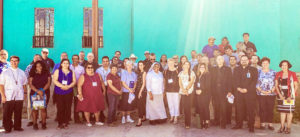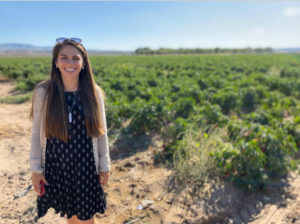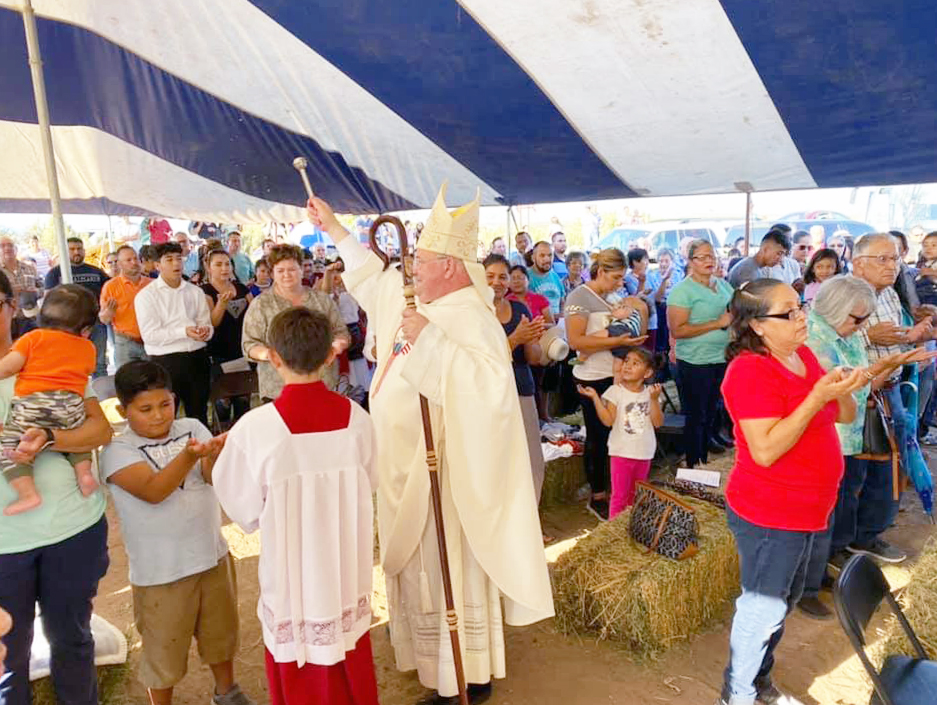Pastoral Juvenil Hispana leader joins clergy, laity from across U.S. to meet with immigrants, refugees where they are
By Emily Booker
In the headlines and political discourse, it’s sometimes difficult to remember that immigration and border discussions are about thousands of individuals, each deserving of dignity and care.
The plight of those individuals at the southern border recently was communicated home to the Diocese of Knoxville by a woman working in Hispanic ministry for the diocese.
In September, Brittany Garcia, coordinator of Pastoral Juvenil Hispana for the diocese, accepted an invitation to join a national delegation that traveled to the U.S.-Mexico border as part of a pastoral encounter sponsored by the U.S. Conference of Catholic Bishops. The weeklong visit served as a lead-up to the World Day of Migrants and Refugees on Sept. 29.
“I was really excited when I received the invitation because there’s so much talk about what’s happening at the border, especially in the media,” Mrs. Garcia said. “I was really thankful for this opportunity to go.”
She emphasized that the agenda for the trip was not political but pastoral. While it’s hard to ignore the publicity and debate surrounding immigration, refugee resettlement, and border security, the visit was focused on meeting the actual people affected by these issues, seeing their situations, and hearing their stories.
“Our Catholic faith is deeply rooted in the belief that there is value and dignity to the life of every person. So in regard to migrants and refugees, the bishops were challenging us about how this is not just politically a topic of interest to us as Catholics, but how this is a topic in regard to the dignity of these refugees, these migrants, these people seeking asylum, people who have traveled from countries of distance to come to the U.S. border and ask for help,” she said.

More than 40 members of a pastoral encounter by the U.S. Conference of Catholic Bishops visited immigrants on the U.S. southern border with Mexico last fall. Members of the mission visited Texas, New Mexico, and Juarez, Mexico.
The USCCB has organized pastoral encounter with migrant farmers every year for the past 16 years, visiting various parts of the country.
This year the encounter included the Diocese of Las Cruces, N.M., the Diocese of El Paso, Texas, and the Diocese of Ciudad Juarez, Mexico. Bishop Mark J. Seitz of the Diocese of El Paso, Bishop Oscar Cantú of the Diocese of San Jose, Bishop Peter Baldacchino of the Diocese of Las Cruces, and Father Robert Stark, regional coordinator of the Vatican’s Section on Migrant and Refugees, attended.
The encounter included visits with refugees awaiting asylum, those who have faced deportation, the victims of the mass shooting in El Paso, and migrant farm workers and their families. The goal of a pastoral encounter to is meet these migrants and refugees face-to-face and take time to learn about their lives and hear their stories.
There also is prayer. For the delegation, it can be a time of learning and compassion. For the migrants and refugees, it can be a time of consolation and validation.
“This year they did very intentionally choose a border town visit for the very reason that there’s so much attention being drawn to the border right now. They thought it was particularly important this year to go there,” Mrs. Garcia said.
‘You belong with your family’
“The best way I could sum up this pastoral visit would be that it was incredibly and deeply moving,” she said. “We were moved by the beauty of culture, the tragedy of injustice that people face, and also by the power of human love—what one is willing to do for love for their family, for a hope for a better future for their kids.”
In El Paso, the 43-member delegation crossed the border into Juarez, where thousands of people are waiting to have their cases heard to enter the United States. There also are people who have been deported from the United States preparing to return to their home countries.
“In Juarez, there were about 1,000-1,500 who were kind of waiting in line. We didn’t count them, but we heard that was the number. We did see them camping out under the bridge, waiting in line to get to the border to then ask for their case to be heard. So there are definitely a lot of people on the side of Juarez,” Mrs. Garcia said.
“We didn’t have any sort of situation come up to make our group feel unsafe. The border was very organized, if you will, even though there was a long line on the side of Juarez. There were clearly checkpoints. There were soldiers from the Mexican side that we saw stationed along the border. On the U.S. side, there were border patrol vehicles that we saw every now and then parked near the border,” she added.
In Juarez, they went to Corpus Christi Parish and del Casa de Migrante, or the migrant house, which provides a shelter for people who are trying to arrange an appointment for their asylum or immigration cases to be heard.
The first thing the delegation saw were two large buses preparing to take 75 people back to El Salvador and Honduras. Mrs. Garcia noted how downcast the people looked.
“You’ve given up time and money and months of your life generally to get to where you’re at, and to receive a no or to go home to where a lot of times the reason they left in the first place is. This isn’t true for every case, but a lot of times it’s because of fear of the mafia, of the government, of politics, of being hungry, whatever it is,” she said. “So to have to go back, they tend to also be somewhat of a target because you’ve left the country. They see you now as a bit of a traitor that you wanted to leave, and then you didn’t make it, so now you’re back. So that’s just a hard reality for people to go back into.”
The visiting bishops gave the people on the buses a blessing for their travel and their safety.
At del Casa de Migrante, Mrs. Garcia met with some of the residents.
“What I wasn’t expecting to encounter was when we went into the kitchen we saw some young people who were serving lunch, who I was speaking to in Spanish, but then they switched to speaking in English. They spoke perfect English, and they told me that they were both deported recently from the U.S. They actually grew up in the U.S.,” she recalled.
One young man shared how his family had brought him to the United States as a toddler. He grew up in Washington state. Because of new restrictions placed on DACA (Deferred Action for Childhood Arrivals that allows immigrants brought to the United States as children to work, study, and get a driver’s license), this young man was not able to apply for the protective status when he turned 18. He was deported to Mexico, a country he’s never known.
“That was really impactful for me because I was expecting to see people from Guatemala, Honduras, who are waiting for their appointment to come into the United States. But I wasn’t expecting to see young people from the United States who had recently been deported,” Mrs. Garcia said. “They’re kind of in this holding ground, if you will, in Juarez.”
“One of the things that really struck me from this young man’s story is he said, ‘Yeah, they deported me back to where I belong.’ One of the priests who was with us at the time really took that opportunity to ask him and push on that. ‘Well, where is your family?’ And he said, ‘My family’s still in Washington.’ And the priest says, ‘Well, that’s where you belong. You belong with your family.’”
In El Paso, the pastoral encounter delegation visited the memorial for the 22 people who died in a mass shooting at a Walmart there on Aug. 3. Another 24 were injured. The memorial has 22 white crosses.
Mrs. Garcia recounted how one of the priests recognized a man laying flowers at one of the crosses. The man had lost his wife in the tragedy, and every day he brought flowers to the memorial. The group was able to meet the man, listen to his story, and share in that moment of grief. A 21-year-old Texan was arrested immediately after the shooting and charged with capital murder. Investigators said they believe his motive was based on white nationalist and anti-immigrant ideologies.
El Paso’s existence revolves around the border, Mrs. Garcia explained. The city felt it was targeted because it is a border town.
Going back and forth is a way of life for many residents.
“They were very threatened in their essence that day,” she explained. “The young shooting suspect was actually from Dallas. Dallas has a lot of Hispanic/Latinos, too. So that begged the question, why did he come here? So just hearing their accounts, they’re pretty convinced that it’s just because of everything that was happening in the media, the attention that the border was getting—that we’re being flooded and run over and crazy things happening at the border—that that’s reportedly why a young man from Dallas would drive six hours to El Paso to carry out this horrific crime.”
Blessings from the Rio Grande
The next leg of the pastoral encounter was with migrant farmers. Migrants travel to the United States for a short time, such as during harvest season, and then return to their home countries. Some spend months away from their families, and they endure hard labor and low wages.
Hatch, N.M., is the chili pepper capital of the world. Although the town has less than 2,000 people, in the surrounding fields migrant farmers work long hours loading 10-gallon buckets with chili peppers. They carry the buckets across the fields, unload them, and fill them again, back and forth for 10-12 hours in the Southwestern heat. For each bucket, they receive a token worth 70 cents. On a good day, the young and strong can fill 100 buckets—$70.
The pastoral encounter delegation met with these workers and learned not just about the farming process but the challenges long, hard hours can put on family life.
Mrs. Garcia noted that many work without gloves because it slows them down.
“So it was just learning little things like that, for us to enter into the reality of what the struggles are like for these migrant workers who are working 12 hours a day, often on weekends. They get up at 1 a.m., are home by 3 or 4 p.m., so they’re often invisible to society because they’re not being seen during the day.”
Four bishops with the pastoral encounter delegation celebrated Mass in the chili fields for the migrant workers. Their families and other members of the community attended, sitting on hay bales.

Brittany Garcia is shown on the USCCB-sponsored pastoral encounter with immigrants on the southern border last fall.
“While we were there, Bishop Baldacchino, who is the local bishop in the diocese of Las Cruces, blessed the water coming from the Rio Grande. He then used that holy water to bless the hands of the migrant workers by going through the aisles of hay bales and sprinkling their hands that they may be blessed in the work that they do to provide food on our tables, for all their suffering and the days out in the sun, all the hours that they give so that the rest of the world might have chili peppers, just really honoring the work that these migrant farm workers do for us, to feed us, to nourish us,” Mrs. Garcia said.
She pointed out that it isn’t just chili fields in New Mexico that rely on migrant workers. Farms all across the country, which are growing a variety of U.S. produce, have migrant workers putting in long, backbreaking hours to keep the country’s agriculture system running.
“I think it’s a challenge to recognize the suffering that was behind that or the hard work that goes into this plate of food that we get to enjoy,” Mrs. Garcia said. “Honor those workers by saying a little prayer for them at dinner time, just keeping them in mind and being respectful of the food, being good stewards of what we’re given.”
Work to be done
Mrs. Garcia’s work with migrants and refugees did not end with the pastoral encounter.
One of the results of the recent V Encuentro was the need to focus on the pastoral care of migrants and immigrants. In January, Mrs. Garcia traveled to the USCCB offices in Washington, D.C., to continue work on how to welcome and advocate for migrants and refugees. She has been chosen to serve on the advisory group for the V Encuentro Immigration and Migrant Ministry.
For the next two years, she and other members of the advisory group will seek ways to implement the findings from the V Encuentro regarding the needs of these demographics; how to overcome cultural, social, and material obstacles; and how to get available resources to dioceses and parishes.
“We’re trying to be faithful to the voices that were heard at the national level for the conclusions of what is urgent pastorally in regards to migrants and refugees,” Mrs. Garcia said.
“That can include meeting their most basic needs, welcoming them into a new community, and providing the space and learning for them to become part of a community.
“It’s our responsibility as lay people, and in particular voters, to educate ourselves on the policies and the laws that are being proposed. Are those policies and laws in congruence with our belief of the dignity of every human person? How will these policies affect migrants and refugees and their quality of life?”
One way to serve immigrants in East Tennessee neighborhoods, Mrs. Garcia suggested, is to make sure parishes have resources to help them when the immigrants arrive in communities around the diocese—where they can go for help, how to navigate the community, schedules of available English classes, etc. There are many resources available, but it takes some work to make sure they reach the local parishes and the people who need them.
Support also can be as simple as a warm smile and introduction after Mass—let each person know that he or she is not only welcome but an important part of the community—that they belong, she said.

